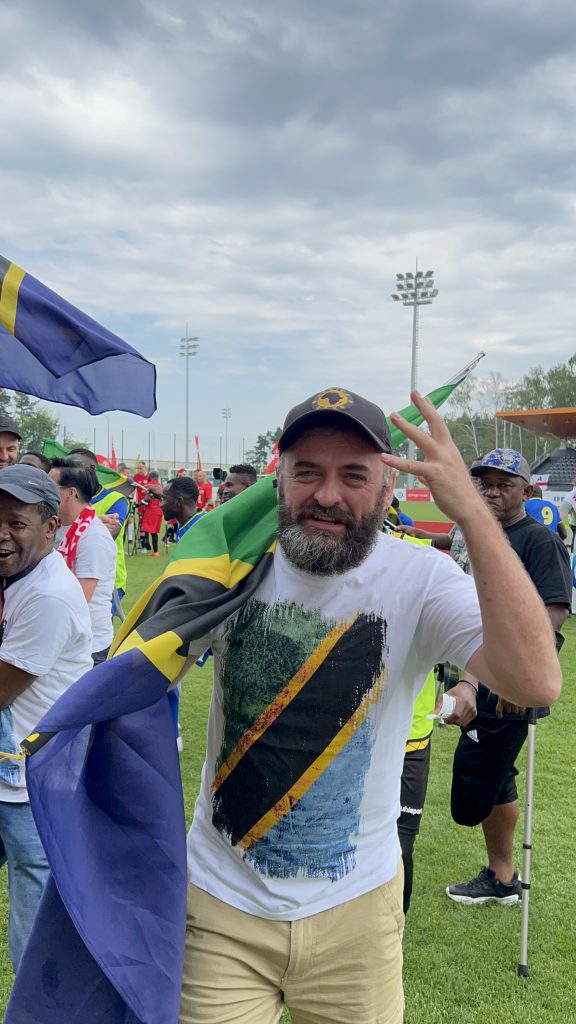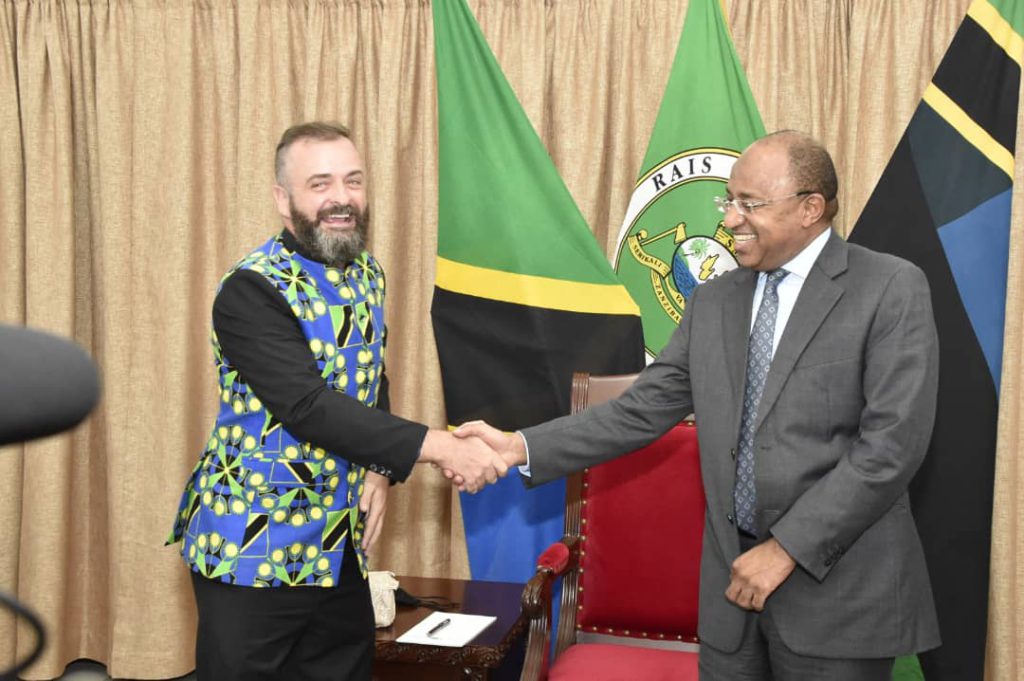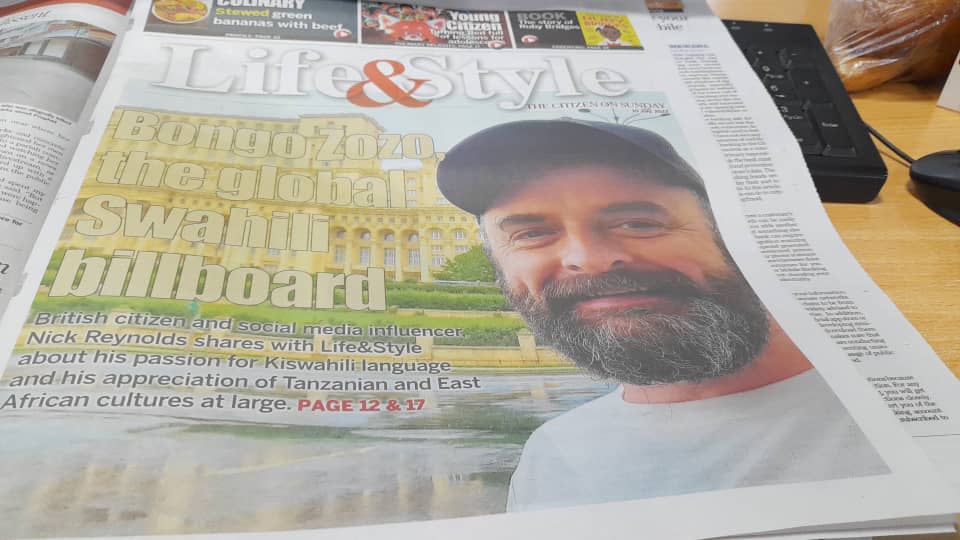Shimbo Pastory
This article was published in The Citizen Newspaper – Tanzania on 10th July, 2022
From Galston, Kilmarnock, in Scotland our international correspondent Shimbo Pastory speaks with Bongo Zozo sitting at Southampton, England down south, about his journey with the Swahili language as we celebrate World Kiswahili language day. Bongo Zozo stands out at a mention of a possible consistent global volunteer in promoting Swahili.
Bongo Zozo, our readers will love to know you.
My name is Nick Reynolds, popular as Bongo Zozo, which is a Shona word meaning ‘chaos.’ I happened to be in Zimbabwe when I started making vlogs, so Bongo Zozo is a lucky character that has made me who I am.
My vlogs are based around Africa, and I travel especially to Tanzania. I raise the Tanzanian flag and my Swahili is mostly Tanzanian. Bongo Zozo is a platform and a way of sharing my experiences around the world and speaking Swahili.
What inspires your passion for Swahili?
What inspires me about Swahili is first of all the fact that I married a Tanzanian woman, Mama Jessica, and I have two grown-up kids now. I’ve lived in Tanzania for 18 years. I learnt Swahili because I needed to communicate.

I was amazed that people who speak English don’t ever learn any other language; they have a kind of arrogance that English is a superior language, a language of business, and everybody else should speak my language.
I wanted to go around that avenue of learning, I like learning things. You look back at school and discover that you have forgotten most of the things. But you cannot forget a language easily.
It’s a useful tool that remains with you. So I decided to go and learn this language. While I was in university it was a bit of competition between us, the wazungu, to see who can learn Swahili the best.
I found it easy to learn Swahili because people, Tanzanians particularly, are very pleased to hear a foreigner give it a try. Going to Vijiwe, people burst with laughter when they hear Mzungu speaking the street Swahili, “Mambo vipi… Hamna noma!”
The street Swahili is really cool, it makes people laugh.
Even in my current vlogs, I use words like ‘kuchamba,’ ‘kusuta,’ words that are going to make people smile. I like to make people smile.
I know foreigners fail to master the accent; while I say “maji moto” my European and American friends say “madjih moutoh”.
How is the rapport between Swahili and the cultural diversity of East Africans?
In terms of cultural diversity and Swahili there is a great link. Of course, if you are not speaking Swahili then you are not really going into many people’s homes, especially in rural areas.
I find a lot of East African cultures, more prevalent in rural areas; the cities are too western. It was the Tanzanian culture that attracted me in the first place. For example, the welcome. To get the feel of the Tanzanian culture you have to speak Swahili.
For example, when I first arrived in Tanzania, in the late 1990s, some old men and women even in rural areas could speak very good English, but I’m not sure about now. There is a lot of cultural association with words. You need to learn a language to learn a culture.
To give some examples, in the previous response I used the word ‘kijiwe,’ you cannot understand this outside its cultural context. There is no word for kijiwe in English because we can’t have them.
People don’t sit around under the trees talking and drinking coffee. They don’t do it here in England. But it is part of the beautiful Tanzanian culture, which is why one has to know the word ‘kijiwe.’
Another word will be ‘kusindikiza,’ which does not really translate very well into English. It could mean to accompany, but in context, it means to walk someone right to their house so that they are safe from animals and ‘majambazi’ (bandits). It is different from England where people just see you at the door.
There is also the word “Pole!” and many others.
You cannot understand African culture if you don’t understand the language. While pole could mean ‘sorry’, you cannot tell a person who fell in the streets here in England ‘Sorry!’ they just want you to help them up. In this case, the word ‘pole’ shows that the Tanzanian culture shows more care than the English culture.
What are your long-term plans regarding promoting Swahili to the world?
In terms of long-term plans for promoting the Swahili language, well, yeah, I love speaking Swahili.
But here is the issue, I make vlogs, I do Facebook, and I get paid nothing for it. The reason I’m paid nothing is that Swahili speakers don’t click on the adverts in YouTube videos. 89% of my followers are from Tanzania, about 8% from Kenya, and the remaining a mixture of people from DRC, Comoros and Uganda.
I hosted Drew Binsky, a great YouTuber, whom I took to Serengeti. He showed me the app where he makes 60,000 dollars a month from his travel vlogs, but I get 3 dollars a month. Swahili speakers don’t click on the adverts, which is why I don’t get paid. That is also a reason why no one else is doing it.
I am not doing it for the money, it’s because I love the Tanzanian people and I use the occasions of my travels to promote Tanzania.

If you do it for the money there is no hope. There are hundreds of people travelling the world, and sharing their experiences in English, and there is one of them who does the same in Swahili, and that is me. But I understand because, among the Swahili speakers and Tanzanians particularly, we are not yet in the stage of buying things online.
Facebook which is my biggest platform does not support Swahili for advertisements; we hope we get there with time. But I plan to continue doing vlogs in Swahili.
Do you feel that your effort is appreciated?
I don’t go around doing it for appreciation. But it is nice and it will be nice to be appreciated.
Do you face any challenges in promoting Swahili?
I do not face any challenges with my promotion to Swahili.
What should we have in prospect with the current global uptake of Swahili?
This is a very interesting question because it ought to do with money. There will be a time when I will also look forward to making money out of the initiatives that will come with my effort in promoting Swahili. When I speak Swahili people listen to me.
I would say there is a need for money to be invested in promoting it, and the money has to be used appropriately. I will take Squid Game as an example. Though many people will watch it with subtitles, you hear the Korean language come out, and it was disseminated all over the world.
Now, why can’t African magic films or any films at all go global? We ought to recognize the necessity of selling what we have.
Most African films are produced with a low budget; another key thing, is they discuss topics which are not interesting to the global audience, a lot of witchcraft, and “umbea ” (gossip); and if there are subtitles, they are often badly translated.
What needs to be done is that more money needs to be directed to filmmakers to improve their production, and invest in qualified and competent expertise in developing the subject matter, such that a story about Africa can be equally interesting and appealing to the wider global audience.
